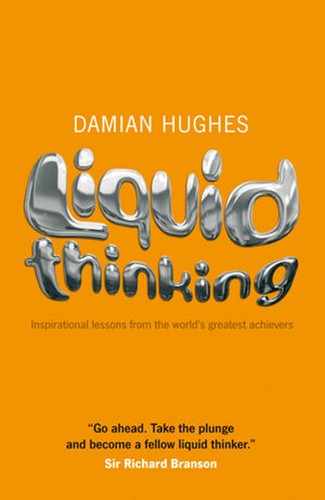"No matter what your age, you are responsible for your own actions, irrespective of the actions or inactions of anybody else. If you are past the age of legal reason, you and only you are accountable for what you do or what you don't do." | ||
| --JERRY SPRINGER, TALK SHOW HOST AND FORMER MAYOR OF CINCINNATI | ||
Jerry Springer, eh? And you thought this book would contain quotes from loads of famous dead people. Well, in my view his words are really relevant to this book and, more importantly, to you.
It is often said that there are three types of people in the world:
those who make things happen
those who watch what happened
and those who say "What happened?"
I am continually amazed and fascinated by the number of people who either consciously or unconsciously believe in fate. What do I mean by that? Try it yourself – listen to your colleagues and your mates talking and count how many times a day you hear them say "if only". "If only the managers here knew how good I am . . . if only people would realise how talented I am . . . if only I had more money . . . if only I were a bit younger . . . if only I were older. . . if only I were in charge around here . . . if only people would listen to me . . . I'd be more successful."
Count how many times you hear yourself saying it (or words to that effect) – and then think about how much energy you're using up in moaning and what you could be using it for instead.
Woody Allen said that the world is run by the people who turn up. When you talk to any successful person, they all say that in life there are either results or excuses.
Or think about what writer George Bernard Shaw said:
"People are always blaming circumstances for what they are. I don't believe in circumstances. The people who get on in this world are the people who get up and look for the circumstances that they want . . . and if they can't find them, they make them."
Richard Branson found the right circumstances to build a business. He decided to set up his Virgin Atlantic airline after he had tried to book a flight to New York and had spent a morning hitting the redial button on the phone, as the only current company doing flights to America was continually engaged. How many of us would find ourselves cursing and getting frustrated? Instead, he saw an opportunity. He reasoned that the company was either very poorly managed, in which case it would be an easy target for new competition, or so much in demand that there was room for new competition. He saw a result, not an excuse to give up trying.
Literally everything you do and everything you are – from how much money you earn to where you work, how successful you are as a parent, a friend or a workmate, and where you live – is a direct result of the decisions you have then made. You've made the decision to pick up this book and read up to this point. I would therefore encourage you to make another decision to read on. You'll read about the lessons you can learn from meeting and reading about successful people, and I hope the structure of the book will make you think and help you achieve what you really want.
Viktor Frankl was a Jewish prisoner who survived the Nazi concentration camps but saw his wife and children killed in them. He has written a book about his experiences and talks about how he was forced to face the worst possible circumstances anyone could imagine, but he still believed that he had a choice. The only thing the Nazis couldn't take from him was his own attitude. He made a deliberate decision that they would not dictate how he felt. He could choose that. He said:
"We who lived in concentration camps can remember the men who walked through the huts comforting others, giving away their last piece of bread. They may have been few in number, but they offer sufficient proof that everything can be taken from a man but one thing: the last of the human freedoms – to choose one's attitude in any given set of circumstances, to choose one's own way."
If that powerful message isn't enough to persuade you to make a choice about your attitude, there is another good reason. You will live longer. You may respond to that by arguing that there is no way taking responsibility for yourself and your circumstances can influence your life expectancy, that lots of variables come into play: diet, work pressures, diseases and so on. So where could you do a study where everyone was submitted to the same environment? How about a convent?
A group of psychologists analysed the attitude of nuns before they entered a convent. They discovered that 90 per cent of the nuns who took personal responsibility for themselves and their lives were still alive at the age of 84. In contrast, only 34 per cent of those who didn't accept full accountability were alive.
Finally, if Jerry Springer is a little too lowbrow for you, I will finish off this chapter by quoting from another notable philosopher, Oprah Winfrey:
"My philosophy is that not only are you responsible for your life, but you are responsible for doing your very best at it at this very moment, which will put you in the best place for the next moment."
Do you choose to sink or swim?
